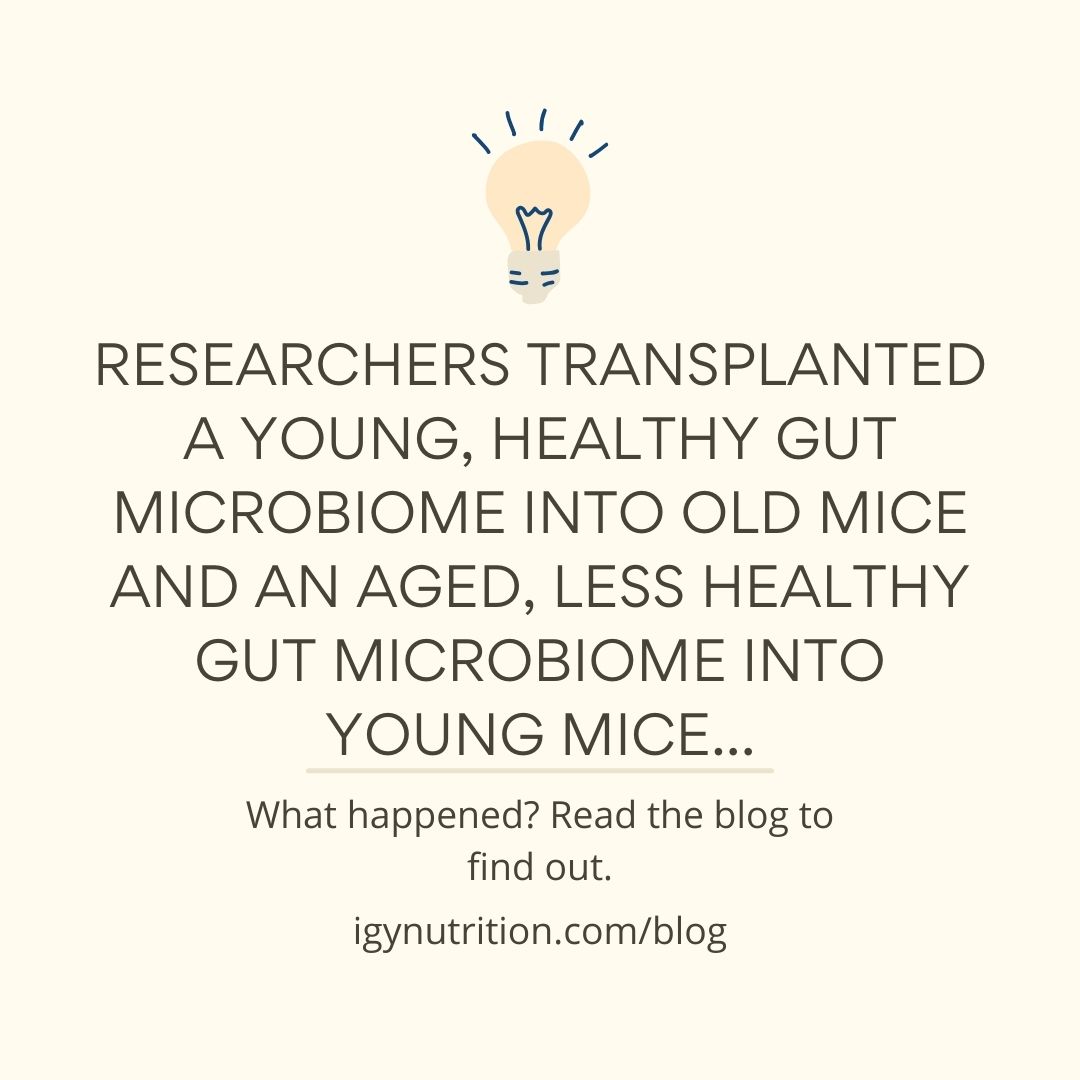Guess what the results of this study were: Dr. Louise McCullogh and her team at UTHealth Houston transplanted a young, healthy gut microbiome into old mice and an aged, less healthy gut microbiome into young mice. The researchers then caused both groups of mice to have strokes and observed how each group recovered.
Which group’s brains recovered more adequately: the older mice with the healthy gut microbiome or the younger mice with the unhealthy gut microbiome?
You guessed it. The older mice with healthy microbiomes had better post-stroke outcomes than the younger mice with unhealthy microbiomes. The older mice’s survival rate increased by more than 50% from baseline, while the younger mice suffered cognitive complications. Many of them died.
You might be thinking – wait, this is the gut we’re talking about. Why would it have anything to do with cognitive health and stroke outcomes? It’s because the gut and the brain are connected through the gut-brain axis! Let’s learn about what that might have to do with neurodegenerative diseases like Alzheimer’s.
How Gut Health Influences the Rest of the Body
First of all – what do we mean when we say gut health? Let’s jog our memories. Millions of microbes—bacteria, yeast, fungi—inhabit our bodies, which collectively form the microbiome. These microbes live in our gastrointestinal (GI) tract, aptly named the ‘gut microbiome’.
While the idea of tiny organisms living inside us might initially seem unsettling, these microbes play essential roles in maintaining our health. They aid in nutrient absorption, metabolism regulation, immune system support, and more (Source).
However, not all of our microscopic inhabitants are friendly. Some can cause harm by damaging our gut lining, promoting inflammation, disrupting metabolism, hormonal balance, immune function, and even mental health.
This presence of too many harmful microbes and too few beneficial microbes can result in dysbiosis. Such an imbalance in the gut microbiome is often considered the root cause of many digestive health issues.
It turns out that this balance of the microbes living in our guts – aka, the composition of the gut microbiome – influences the way other body systems function. Gut microorganisms play fundamental roles in many aspects of human biology, including:
- Metabolism (Source)
- The endocrine system (hormones) (Source)
- The reproductive system (Source)
- The nervous system (where mental and cognitive health comes in!) (Source)
- The immune system (Source)
- The musculoskeletal system (Source)
Dysbiosis, an imbalanced microbiome, is associated with increased susceptibility to infections and diseases like obesity, diabetes, cardiovascular diseases, allergies, and other inflammatory diseases due to these connections.
The Gut Microbiome and the Brain
Scientists have recently discovered that there is a link between gut microbiota and the brain. They call this connection the gut-brain axis (Source).
Gut microbes influence levels of neurotransmitters such as dopamine, serotonin, and epinephrine. Imbalanced neurotransmitter levels due to dysbiosis have been implicated in diseases like Parkinson’s, depression, anxiety, autism, and even dementia (Source).
The gut-brain axis can also operate in the opposite direction. The brain can influence the gut. For example, stress may negatively impact microbial balance. How so?
When stressed, the body releases catabolic hormones and inflammatory cytokines that impact the environment where microbes live (your gut) (Source). These stress-induced environmental changes may increase or decrease the amount of helpful and harmful microbes occupying the intestines – a bad thing for gut health.
While more research is needed to clarify the complex bidirectional interactions associated with the gut-brain axis, promising evidence suggests that gut health should be part of any mind-body health program. In short, a healthy gut lays the foundation for a healthy mind.
What We Know About the Gut Microbiome and Alzheimer’s
Think back to the study out of UTHealth Houston we discussed at the beginning of this blog. McCullough and her team transplanted a young, healthy gut microbiome into old mice and an aged, less healthy gut microbiome into young mice. The older mice with healthy microbiomes had better outcomes than the younger mice with unhealthy microbiomes – but why?
The researchers found that many of the cognitive issues the younger mice with older microbiomes suffered from were inflammation-related. The inflammation seemed to be caused by the intestinal permeability that their low-quality microbiomes induced.
Intestinal permeability is a lot like how it sounds. The gut barrier is intended to only permit certain things through it. It’s like a bouncer – only those on the list can get in. Nutrients like vitamins, proteins, electrolytes, and water are “on the list.” Pathogens and undigested food particles are not. So, ideally, the barrier does not let them into the body. Instead, it helps the body to get rid of them through the stool.
However, in cases of dysbiosis, excessive NSAID use, and inflammatory food and drink consumption, the gut barrier begins to weaken (Source). The weaker it gets, the more porous it gets. Increased permeability means that random things from inside the gut – those who aren’t on the list – may get by our bouncer, the gut barrier, and enter our bodies. That is what we call intestinal permeability or leaky gut syndrome.
The food particles and pathogens that overly-permeable gut barriers allow to enter our bloodstream tend to cause inflammation throughout the body – including in the brain. That seems to be what was happening with McCullough’s young mice: their poor microbiome composition was causing increased intestinal permeability and, thereby, inflammation in the brain.
McCullough and her team wanted to see if improving the mice’s gut microbiome could alleviate some of the cognitive issues they were experiencing. She supplied the mice with prebiotics to increase their short-chain fatty acid levels. Miraculously, their cognitive issues improved, and their brain inflammation declined.
This outcome suggested to her and her team that improving the gut microbiome could significantly alleviate post-stroke cognitive decline. But their curiosity didn’t stop there. They also wanted to see how that could impact mice with Alzheimer’s and other neurodegenerative diseases since previous research has identified specific gut microbes associated with neurodegenerative diseases.
Wonder what they found? Us too! Check out part 2 of this series next week to find out more. Follow us on @igynutrition for more updates as well! See you then.




